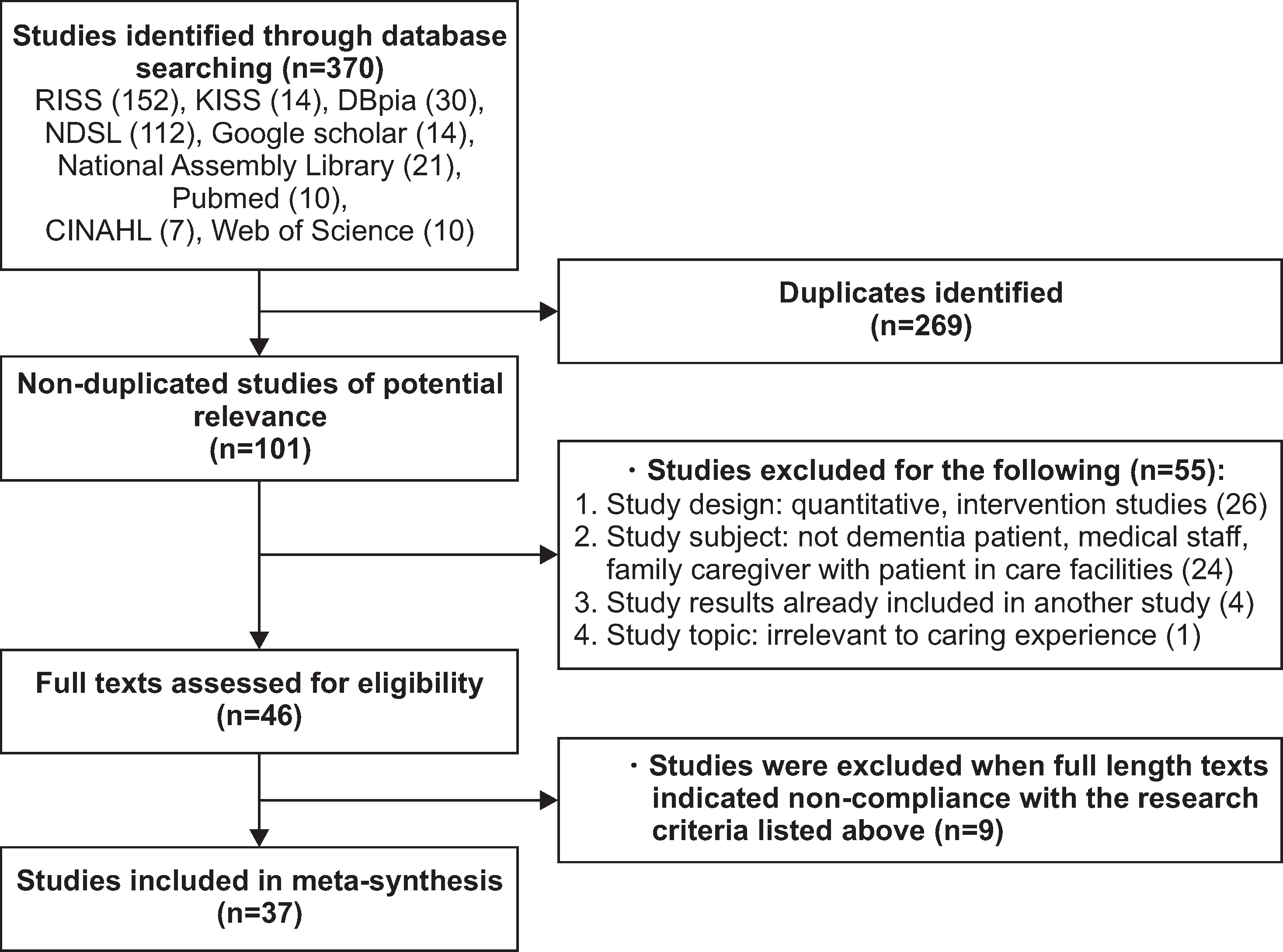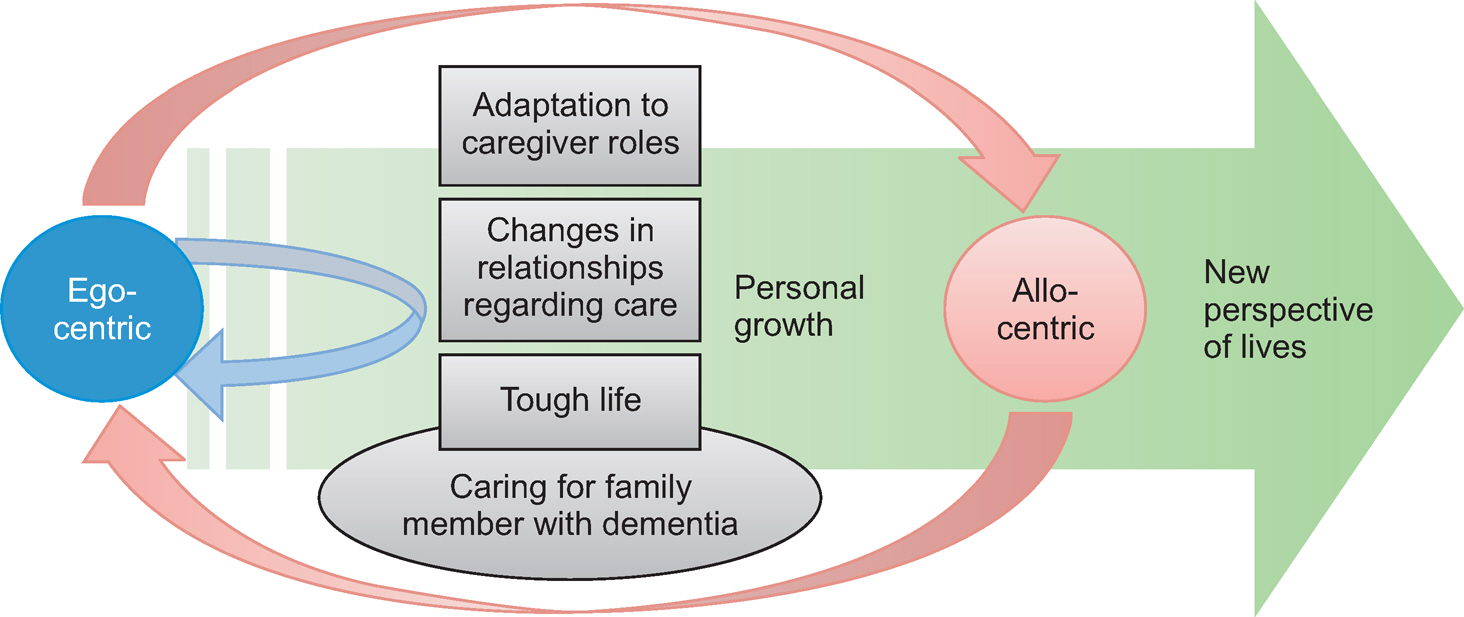J Korean Acad Nurs.
2018 Oct;48(5):601-621. 10.4040/jkan.2018.48.5.601.
Shifting of Centricity: Qualitative Meta Synthetic Approach on Caring Experience of Family Members of Patients with Dementia
- Affiliations
-
- 1Department of Nursing, Baekseok University, Cheonan, Korea.
- 2College of Nursing · Institute of Health Sciences, Gyeongsang National University, Jinju, Korea.
- 3College of Nursing, Dankook University, Cheonan, Korea.
- 4Department of Nursing, Hoseo University, Asan, Korea.
- 5Department of Nursing, Suwon Women's University, Suwon, Korea. kimhj@swc.ac.kr
- KMID: 2424366
- DOI: http://doi.org/10.4040/jkan.2018.48.5.601
Abstract
- PURPOSE
This study aimed to synthesize the caring experiences of Korean family members of patients with dementia through a qualitative meta-synthesis method.
METHODS
By searching through nine Korean and English databases, we compared 37 qualitative studies on caring experiences of family members of patients with dementia. The selected studies were synthesized through meta-synthesis, proposed by Sandelowski and Barroso (2007).
RESULTS
The meta-synthesis elicited four themes: tough life due to care for patients, changes in relationships, adaptation to caregiver's roles, and new perspectives of life through personal growth. Caregivers were shocked when a sudden diagnosis of dementia was made prior to any preparation on their part. They were tied to their patients all the time and their mind and body got exhausted. Their relationship with patients began to change and they looked at them differently. They experienced conflicts with the other non-caring family members and were alienated from them. They were also socially isolated. However, by building their own care strategies and utilizing social resources, they gradually adapted to their caregiver roles. Finally, they experienced personal growth and acquired a new perspective toward life by accepting their roles and finding meaning in their lives. Shifting the caregiver's centricity from themselves to the patient was the process of becoming human beings who actively constructed their realities while giving meaning to their painful lives and interacting with the environment.
CONCLUSION
The results of the study can be useful for nurses in understanding the experiences of caregivers of the patients with dementia and in providing them with practical interventions.
Keyword
MeSH Terms
Figure
Reference
-
References
1. National Institute of Dementia. Korean dementia observatory 2016 [Internet]. Seongnam: National Institute of Dementia;c2017. [cited 2017 Nov 15]. Available from:. https://www.nid.or.kr/info/dataroom_view.aspx?bid=160.2. Park KY. The effectiveness of interventions for individuals with dementia: a qualitative meta-analysis. Journal of the Society of Occupational Therapy for the Aged and Dementia. 2009; 3(2):23–32.3. Fine M, Glendinning C. Dependence, independence or inter-dependence? Revisiting the concepts of ‘care’ and ‘dependency’. Ageing & Society. 2005; 25(4):601–621. https://doi.org/10.1017/S0144686X05003600.
Article4. National Institute of Dementia. National responsibility system for demential [Internet]. Seongnam: National Institute of Dementia;c2018. [cited 2018 Apr 16]. Available from:. http://치매국가책임제.nid.or.kr/sub/nid00_1.html.5. Kim CM. The coping process of family caregivers for demented elderly. Journal of Korean Academy of Community Health Nursing. 2005; 16(3):249–259.6. Kim YJ. Understanding family caregivers’ experiences of living with dementia: A transcendental phenomenological inquiry. Journal of the Korean Gerontological Society. 2007; 27(4):963–986.7. Lee HJ. Caregiving experience and adaptation process of the husbands who are caring for wives with Alzheimer: Focusing on elderly couple household. Journal of the Korean Gerontological Society. 2006; 26(1):45–62.8. Paterson BL, Thorne SE, Canam C. Meta-study of qualitative health research: A practical guide to meta-analysis and meta-synthesis. Thousand Oaks (CA): Sage;2001. p. 1–176.9. Sandelowski M, Barroso J. Handbook for synthesizing qualitative research. New York: Springer Publishing Company;2007. p. 1–312.10. Sandelowski M, Barroso J. Toward a metasynthesis of qualitative findings on motherhood in HIV‐positive women. Research in Nursing & Health. 2003; 26(2):153–170. https://doi.org/10.1002/nur.10072.
Article11. Critical Appraisal Skills Programme (CASP). CASP Qualitative check list [Internet]. Oxford: CASP;c2017. [cited 2017 Jan 30]. Available from:. http://docs.wixstatic.com/ugd/dded87_25658615020e427da194a325e7773d42.pdf.12. Perry-Young L, Owen G, Kelly S, Owens C. How people come to recognise a problem and seek medical help for a person showing early signs of dementia: A systematic review and meta-ethnography. Dementia (London). 2018; 17(1):34–60. https://doi.org/10.1177/1471301215626889.
Article13. Large S, Slinger R. Grief in caregivers of persons with Alzheimer’s disease and related dementia: A qualitative synthesis. Dementia (London). 2015; 14(2):164–183. https://doi.org/10.1177/1471301213494511.
Article14. Alzheimer’s Association. 2018 Alzheimer’s disease facts and figures. Alzheimer’s & Dementia. 2018; 14(3):367–429. https://doi.org/10.1016/j.jalz.2018.02.001.15. Ribeiro O, Paúl C. Older male carers and the positive aspects of care. Ageing & Society. 2008; 28(2):165–183. https://doi.org/10.1017/S0144686X07006460.
Article16. Shim B, Barroso J, Davis LL. A comparative qualitative analysis of stories of spousal caregivers of people with dementia: Negative, ambivalent, and positive experiences. International Journal of Nursing Studies. 2012; 49(2):220–229. https://doi.org/10.1016/j.ijnurstu.2011.09.003.
Article17. Butcher HK, Buckwalter KC. Exasperations as blessings: Meaning-making and the caregiving experience. Journal of Aging and Identity. 2002; 7(2):113–132. https://doi.org/10.1023/A:1015439218276.18. Sung MR, Kim KA, Lee DY. Factors influencing burnout in primary family caregivers of elders with dementia. Journal of Korean Gerontological Nursing. 2012; 14(3):200–208.19. Noyes BB, Hill RD, Hicken BL, Luptak M, Rupper R, Dailey NK, et al. Review: The role of grief in dementia caregiving. American Journal of Alzheimer’s Disease & Other DementiasⓇ. 2010; 25(1):9–17. https://doi.org/10.1177/1533317509333902.
Article20. Van Vliet D, de Vugt ME, Bakker C, Koopmans RT, Verhey FR. Impact of early onset dementia on caregivers: A review. International Journal of Geriatric Psychiatry. 2010; 25(11):1091–1100. https://doi.org/10.1002/gps.2439.
Article21. Kim MY. Factors influencing posttraumatic growth in fathers of chronically ill children. Journal of Korean Academy of Nursing. 2015; 45(6):890–899. https://doi.org/10.4040/jkan.2015.45.6.890.
Article22. Lee KS, Min YC. Psychological adjusting process to diseases in people with chronic illnesses. Journal of Korean Academy of Psychiatric and Mental Health Nursing. 2008; 17(2):151–160.23. Lindauer A, Harvath TA. The meanings caregivers ascribe to dementia-related changes in care recipients: A meta-ethnography. Research in Gerontological Nursing. 2015; 8(1):39–48. https://doi.org/10.3928/19404921-20141121-01.
Article24. Lloyd J, Patterson T, Muers J. The positive aspects of caregiving in dementia: A critical review of the qualitative literature. Dementia (London). 2016; 15(6):1534–1561. https://doi.org/10.1177/1471301214564792.
Article25. Lepore SJ, Greenberg MA. Mending broken hearts: Effects of expressive writing on mood, cognitive processing, social adjustment and health following a relationship breakup. Psychology and Health. 2002; 17(5):547–560. https://doi.org/10.1080/08870440290025768.
Article26. Carlick A, Biley FC. Thoughts on the therapeutic use of narrative in the promotion of coping in cancer care. European Journal of Cancer Care. 2004; 13(4):308–317. https://doi.org/10.1111/j.1365-2354.2004.00466.x.
Article27. Dam AEH, de Vugt ME, Klinkenberg IPM, Verhey FRJ, van Boxtel MPJ. A systematic review of social support interventions for caregivers of people with dementia: Are they doing what they promise? Maturitas. 2016; 85:117–130. https://doi.org/10.1016/j.maturitas.2015.12.008.
Article28. Park S, Park M. Effects of family support programs for care-givers of people with dementia - caregiving burden, depression, and stress: Systematic review and meta-analysis. Journal of Korean Academy of Nursing. 2015; 45(5):627–640. https://doi.org/10.4040/jkan.2015.45.5.627.
Article29. Freeman M. Hindsight: The promise and peril of looking backward. Oxford: Oxford University Press;2010. p. 1–247.30. Parse RR. The human becoming school of thought. 1st Kor. Ed.Lee JS, Lee OS, Koh MS, translators. Seoul: Hyunmoonsa;c2002. p. 1–170.
- Full Text Links
- Actions
-
Cited
- CITED
-
- Close
- Share
- Similar articles
-
- Qualitative Meta-synthesis of Nurses' Caring Experience for People with Dementia
- Experience of a Special Rating Dementia Service for Family Caregivers of Elderly People with Dementia
- Characteristics of Early Onset Dementia and Caring Experiences and Service Needs of Family Caregivers: A Mixed Methods Study
- Women Caregivers' Experiences in Caring at Home for a Family Member with Dementia: A Feminist Approach
- Experience of Dementia-related Anxiety in Middle-aged Female Caregivers for Family Members with Dementia: A Phenomenological Study



